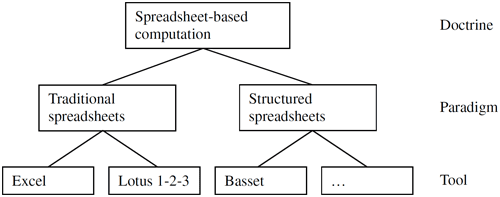Authors
Markku Tukiainen
Abstract
Empirical studies of spreadsheet programming have commonly shown high overall error rates but only little attention has been paid to reasons for these errors.
One often mentioned cause for errors is the low conceptual level of spreadsheet systems, e.g. the lack of abstraction and modularity mechanisms. By offering these kinds of mechanisms to spreadsheet users, we wanted to study whether the conceptual level has an effect on types of errors produced.
The higher conceptual level paradigm offered is the structured spreadsheet calculation paradigm, which utilizes goals, plans and spreadsheet data structures in computation.
In this paper, we present an empirical study with novice users, comparing the traditional spreadsheet calculation paradigm and the structured spreadsheet calculation paradigm.
The results show that the two different paradigms produce different error behaviors.
Sample

Error causes are categorized in terms of the computation doctrine, i.e. spreadsheet-based computation (as opposed, e.g. to procedural programming), the spreadsheet calculation paradigm used and the spreadsheet calculation tool's usability issues.
Publication
2001, Interacting with Computers, Issue 13, Number 4, April, pages 427–446
Full article
Comparing two spreadsheet calculation paradigms: An empirical study with novice users
